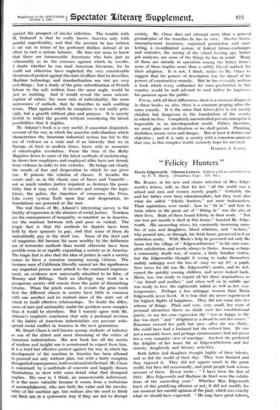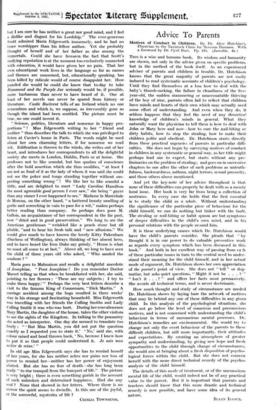" Felicity Hunters"
Maria Edgeworth—Chosen Letters. Edited with an introduction by E V. Barry. (Jonathan Cape. 12s. 6d.)
bility that it may exist.. It invades and corrupts the legis-. , worth's letters, tells us that for her " all the world was a
lature; -the pace, the chaMbers of -cOmmerce, the Press. . school and men and women merely pupils." Certainly she Like every system t uilt upon fear and desperation, its and her father were born educationalists, but they were also
foundations are poisoned at the root. what she called " felicity hunters," not mere taskmasters.
The real thesis; of_ Mr._Adamic's interesting' . sin. vey -is the Their aspirations were social : how to " fit in " and how to
futility of repression in the absence of social justice. Nowhere train others in the great art of " fitting in " was the aim of are the consequences of inequality so manifest as in America, their lives. Both of them found felicity in their work. " Not implies. His case is, I think, an unanswerable indictment. 1812. Miss Edgeworth and Madame de Stael were the exhibi- It is- the- more valuable because -it comes from a technician tions of the succeeding year." Whether Miss Edgeworth but I am sure he has neither a great nor good mind, and I feel a dislike and disgust for his Lordship." The ever-generous Scott admired Maria Edgeworth immensely, and he had no truer worshipper than his fellow author. Yet she probably thought of herself and of her father as also among the inuportals. Could she have foreseen the fact that Scott's undying reputation is at the moment too exclusively connected with education, it would have given her no pain. That her own educational work lives in the language so far as names and themes are concerned, but, educationally speaking, has been killed by ridicule would of course disappoint her. How•
puizled she would be could she know that to-day to take Rosamond and thi Purple Jar seriously would be, if possible,
more barbarous than never to have heard of it. One at
least of her novels can never be spared from history or literature. Castle Rackrent tells of an Ireland which no one
remembers and which is, we suppose, as irrevocably gone as though the island had been scuttled. The picture must be true, no one could invent it.
`,` Science, politics, literature and nonsense in happy pro- portions " ! Miss Edgeworth writing to her " friend and mother " thus describes the talk to which she was privileged to listen at Cuvier's house in Paris. The words might be used about her own charming letters, if for nonsense we read wit. Edification is thrown to the winds, she writes out of her heart, and introduces her correspondents to all the delightful society she meets in London, Dublin, Paris or at home. She professes not to like scandal, but has qualms of conscience after the bold assertion which she thus modifies, " at least I am not as fond of it as the lady of whom it was said she could not see the poker and tongs standing together without sus- pecting something wrong " ! We like her to like scandal a little, and are delighted to meet " Lady Caroline Hamilton
the most agreeable good person I ever saw," she being " gayer
than any sinner I ever happened to see." Madame la Marechale de Moreau, on the other hand, " a battered beauty smelling of garlic and screeching in vain to pass for a wit," makes perhaps better reading than company. So perhaps does poor M. Gallois, an acquaintance of her correspondent in the far past, now dried and in good preservation." We long to see the American gentleman " wrinkled like a peach stone but all pliable, "and to hear his fresh talk and " new allusions." We would give much to have known the lovely Kitty Pakenham (Duchess of Wellington), always thinking of her absent hero, and to have heard the Iron Duke say grimly, " Home is what we must all come to at last." Above all, we long to have seen the child of three years old who asked, " Who sanded the seashore ? "
Maria goes to Malmaison and recalls a delightful anecdote of Josephine. " Poor Josephine ! Do you remember Doctor Marcet telling us that when he breakfasted with her, she said, pointing to her flowers : ' These are my subjects ; I try to make them happy.' " Perhaps the very best letters describe a visit to the famous King of Connemara, " Dick Martin." A carriage accident among the bogs resulted in three weeks' stay in his strange and fascinating household. Miss Edgeworth was travelling with her friends the Culling Smiths and Lady Culling Smith• it was who was hurt. During her convalescence Mary Martin, the daughter of the house, takes the other visitors to see the sights of the Kingdom. In talking to the peasantry she acted as interpreter. One day she seemed to translate too freely : " But Miss Martin, you did not put the question
exactly as I requested you to state it.' No,' said she, with colour raised and head thrown back, No, because I knew how to put it so that people could understand it. Je said mon metier de refine.' "
In old age Miss Edgeworth says she has to remind herself of her years, for she has neither aches nor pains nor loss of
power to remind her—neither has her power of enjoyment abitted. But she has no fear of death—she has long been ready " to rise tranquil from the banquet of life." The picture is very bright ; there is even something garish in the account of such unbroken and determined happiness. Had she any soul ? None that showed in her letters. Where there is no sorrow the spirit seems to dwindle. Is this one of the joyful, or the sorrowful, mysteries of life ?
CECILIA TOWNSEND.











































 Previous page
Previous page